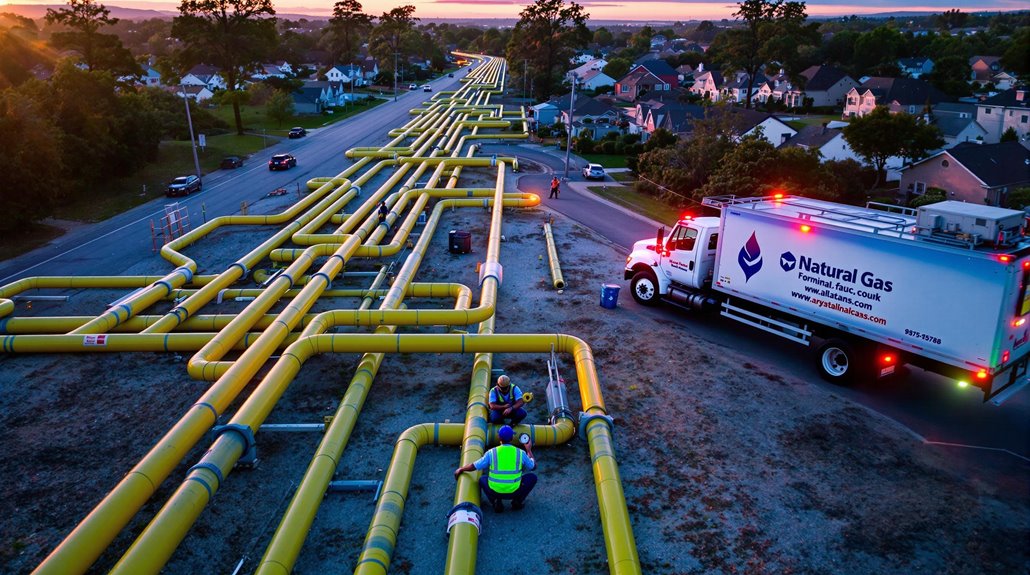What Is the Role of a Local Natural Gas Distribution Company?

Your local natural gas distribution company (LDC) manages the final leg of getting natural gas to your home or business. They operate and maintain the vast network of distribution pipelines that connect major transmission lines to end-users, while implementing critical safety measures and emergency response systems. As regulated utilities, LDCs guarantee reliable service within their designated territories and are adapting to incorporate renewable energy solutions. Uncover how these essential companies keep your community's energy flowing safely and sustainably.
Understanding Local Distribution Companies (LDCs) and Their Core Functions
While the natural gas industry has evolved drastically over the time, Local Distribution Companies (LDCs) remain essential players in supplying gas to end users. As local gas utilities, they're responsible for managing the final leg of the natural gas system, operating the distribution network that connects interstate natural gas pipelines to your home or business.
Your local distribution company handles indispensable aspects of natural gas distribution, including maintaining infrastructure, implementing safety measures, and ensuring emergency preparedness. They're the ones who transport gas through smaller pipelines to reach end-use customers in their designated service areas. Whether you're buying gas directly from marketers or through the LDC itself, these gas utilities manage the physical delivery and maintain the infrastructure that keeps natural gas safety a top priority in your community. During power outages, having access to alternative energy sources becomes crucial for maintaining essential services and heating in urban areas.
Safety Measures and Emergency Response Systems
Local Distribution Companies prioritize public safety above all other responsibilities through thorough safety protocols and emergency response systems. Your local company uses advanced leak detection equipment to monitor pipelines and quickly address any issues in the distribution network. They've established comprehensive control systems and safety procedures to protect you and your community, including 24/7 on-call technicians ready to respond to emergencies. Having access to emergency medical supplies during blackouts is crucial since gas-related incidents may occur when power is disrupted.
- You'll feel secure knowing that well-trained professionals are constantly monitoring natural gas pipelines to keep your family safe
- You can rely on immediate emergency response when you need it most, day or night
- You'll gain peace of mind through safety education programs that teach you how to protect yourself and your loved ones
These measures guarantee you're protected by multiple layers of safety systems and knowledgeable professionals.
Regulatory Framework and Service Territory Management

Because natural gas distribution requires extensive infrastructure investment, your utility company operates as a regulated monopoly within designated service territories. State commissions oversee investor-owned local distribution companies to guarantee you receive dependable service at reasonable rates. These regulators play an important role in balancing consumer costs with the utility's need to maintain extensive distribution networks.
Your gas distribution pipe system connects Gas Transmission lines to homes, businesses, and community centers. The local distribution company must maintain control and data systems while providing gas to consumers safely and efficiently. If you're served by a publicly-owned utility, local government agencies, rather than state commissions, supervise operations and pricing. This regulatory structure helps certify your utility can sustainably operate while keeping prices fair and service reliable. Similar to active power measurements in electrical systems, natural gas utilities must carefully monitor and measure the actual energy delivered to customers.
Distribution Infrastructure and Pipeline Network Operations
A vast network of over 2 million miles of distribution pipelines forms the backbone of your local gas company's infrastructure. This intricate distribution network connects to larger interstate and intrastate pipelines, guaranteeing reliable gas supply to your home. Using advanced SCADA systems, your gas company monitors gas delivery at lower pressures while maintaining the highest safety standards.
Modern natural gas hookups benefit from newer technologies, including:
- Flexible plastic and stainless steel piping that's more resilient and easier to install than traditional materials
- Guided drilling techniques that minimize disruption to your neighborhood during energy transmission
- Smart monitoring systems that certify natural gas safety procedures are followed 24/7
Your local gas company's sophisticated infrastructure enables them to continue supplying natural gas safely and efficiently to your community while adapting to new technological advances. The integration of IoT-enabled systems allows for remote monitoring and automated self-testing of critical safety equipment throughout the distribution network.
Decarbonization Initiatives and Future Energy Solutions

Natural gas distributors are leading three major decarbonization initiatives to guarantee a sustainable energy future. You'll find them deploying hybrid heat pumps, renewable natural gas, and hydrogen solutions while maintaining strong energy efficiency programs. They're also partnering with organizations to better detect and fix fugitive emissions across their networks.
For large-scale developments, you can see LDCs implementing combined heat and power and networked geothermal systems as innovative infrastructure solutions. These companies are securing federal funding to scale up renewable natural gas and hydrogen technologies, which are vital for long-term decarbonization plans. Through close coordination with the electric sector and their extensive approach to emissions reduction, LDCs are uniquely positioned to champion these sustainable solutions and reshape the energy environment.




